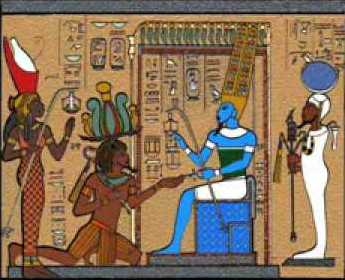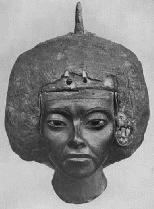thanks to Kenneth Ritchards
mirrored
GLOBAL_AFRICAN_COMMUNITY
LECTURE NOTES

Healing the Sex Divide (Yoknyam Dabale)
Great Black Women in History
INTRODUCTION: THE GLORY AND MAJESTY OF AFRICAN AMERICAN WOMEN
For many thousands of years the African woman has been worshipped, revered and idolized by individuals, families and nations--not only in Africa but around the world. Ancient records show her as queen, goddess, scholar, diplomat, scientist, icon, prophet and freedom fighting warrior exalted with and sometimes above her father, husband and brothers. The African woman has administered great and mighty nations, led determined and capable armies into battle and founded splendid and enduring royal dynasties. Indeed, no other human of any racial or ethnic type has been so widely venerated as has the African woman. This brief essay, therefore, is intended as a secure African man's historical recognition, tribute and salute to the prominence, grandeur and majesty of African women.
KMT: BLACK LAND OF ANCIENT AFRICA
Of all the countries of ancient times it is Kmt (Ancient Egypt) that stands out above all others. Kmt was indeed the heart and soul of early Africa. When we examine Kemetic civilization we note what is perhaps the proudest achievement in the whole of human annals. It is therefore proper that we look first at the role and stature of African women in Kmt in the Valley of Nile.
First things first--Kmt was African; not only her origins, but from the very beginning and through the great part of the pharaonic period African people endowed with dark complexions, full lips, broad noses and tightly curled hair were overwhelmingly dominant in both the general population and the ruling elite. Ancient Kmt was Africa par excellence.
It has been noted that the most significant single fact to keep in mind when discussing the topic of women and leadership in ancient Kmt is that there was basic equality between men and women. Women of the ancient Kemetic royal families enjoyed considerable influence and freedom of movement, and occupied positions of great power and authority. There is not a single recorded incident of sexual assault or domestic abuse against an African woman in the entire history of Kmt. Kemetic women inherited and willed fortunes, wrote love poems, introduced legislation at the courts of law and commanded the respect of king and commoner alike.
YOUR MAJESTY: GREAT QUEENS OF KMT (ANCIENT EGYPT)
Queen Ahmose-Nefertari, participated actively in the expulsion from Kmt of the Hyksos--Kmt's first invaders and occupiers. Ahmose-Nefertari was born royal heiress and became one of Africa's most brilliant queens. After the twenty-five year reign of Ahmose I, Nefertari governed jointly with her son Amenhotep I. The veneration of Ahmose-Nefertari continued for more than six-hundred years after her death. To her memory was attached a special priesthood, who recited in her honor a prayer only used in addressing the gods.
Ahmose-Nefertari was given considerable authority in the cult of the King of the Gods when she was made "God's Wife of Amen," a position that held a chief role as a priestess in the national religious center, and was provided with goods and property legally documented and published for all to see on a monumental stela set up in the Temple of Amen at Karnak. Her royal titles included the exceptional "Female Chieftain of Upper and Lower Kmt."
Makare Hatshepsut's twenty-one year reign occurred near the zenith of Kmt's second golden age. This was an era marked by great internal stability and international prestige. One of the Hatshepsut's proudest achievements was a highly successful expedition to the African land of Punt--regarded by the Kamites as "God's land." Hatshepsut's royal titles included: "King of the North and South, Son of the Sun, The Heru of Gold, Bestower of Years, Goddess of Risings, Conqueror of all Lands, Lady of both Lands, Vivifier of Years, Chief Spouse of Amen, the Mighty One."
Queen Tiye was the beloved wife of Nebmare Amenhotep III, and the mother of Akhenaten and Tutankhamen. Tiye is one of the most interesting figures in history. Amenhotep and Tiye married while quite young and shared one of the great love affairs of the ages. That she was of great ability and powerful influence is proved by association with her husband in all of his ceremonial records. She was such an integral part of Kamite affairs that on more than one occasion foreign sovereigns appealed to her directly in matters of international significance. The surviving portraits of Tiye show her with distinct African features.
Queen Nefertari was "The Beautiful Companion" of Ramses II. Her two major titles were "King's Great Wife and "Mistress of the Two Lands." After her death, Nefertari was worshipped as a divine Osirian, or a soul which has become deified. Under the attributes of Asr (Osiris), Kmt's lorder of the dead, she was adored as a goddess. Queen Nefertari's body was housed in a 5,200 square foot tomb decorated with vivid wall paintings--the most splendid in the Valley of the Queens--"The Place of Beauty." Her tomb paintings and inscriptions depict Nefertari as a woman of great charm and exquisite taste, adorned with magnificent jewelry and wearing fashionable gowns.
Queen Istnofret, another distinguished African woman, was a contemporary of Nefertari, and was elevated to the position of Great Royal Wife upon Nefertari's death. Queen Istnofret was the mother of Prince Ramses (Senior King's Son). Prince Khaemwaset (one of the most brilliant men of the Ramesside era) and Prince Merneptah--who eventually succeeded his father as King. Queen Istnofret died in approximately year 24 of Ramses II's reign.
FREEDOM FIGHTERS AND RESISTANCE LEADERS
Although it was was extremely prominent, Kmt (Ancient Egypt) was only one of many great African nations where women held high positions. Makeda, for example, the semi-legendary Queen of Sheba (Saba), is thought to have lived during the tenth century B.C.E. This woman had all the qualities of an exceptional monarch, and appears to have ruled over a wealthy domain encompassing parts of both Africa and Arabia. She is called Makeda in the Ethiopian text known as the Kebra Negast, Bilqis in the Koran, and the Queen of Sheba in the Bible. The three of these documents provide a relatively clear picture of a highly developed state distinguished by the pronounced overall status of women. Makeda was not an isolated phenomenon. Many times, in fact, do we hear of important women in African and Arabian history; the documents they are mentioned in providing no commentary on husbands, consorts or male relatives. Either their deeds or inheritance, perhaps both, enabled them to stand out quite singularly.
Dahia al-Kahina of Mauritania was especially active in the North African resistance to the Arab invasions that occurred at the end of the seventh century. About 690 she assumed personal command of the African forces, and under her aggressive leadership the Arabs were briefly forced to retreat. The Arab invaders of Africa were relentless, however, and as the African plight deteriorated, the dauntless Kahina ordered a scorched earth policy. The effects of the devastation can still be seen in the North African countryside. According to tradition, Kahina eventually took her own life rather than admit defeat to the Arabs. With her death ended a magnificent attempt to preserve Africa for the Africans.
Queen Nzingha, also known as Ann Nzingha, was overlord of portions of both Angola and Zaire. She has been called the "greatest military strategist that ever confronted the armed forces of Portugal." Nzingha's military campaigns kept the Portuguese in Africa at bay for more than four decades. Her objective was nothing less than the complete and total destruction of the African slave trade. Nzingha sent ambassadors throughout West and Central Africa with the intent of enlisting a huge coalition of African armies to eject the Portuguese. Queen Nzingha died fighting for her people in 1663 at the ripe old age of eighty-one. Africa has known no greater patriot.
In summary, and in the words of Dr. John Henrik Clarke, "The first accomplishment of the African woman, in partnership with the man, was the creation of a functioning family unit. This major step in human development laid the foundations of the organization of all subsequent societies and institutions. In Africa the woman's `place' was not only with her family. She often ruled nations with unquestioned authority."
Copyright 1998 Rashidi. All rights reversed.
Revised: October 15, 2000.
rrashidi@swbell.net
DEDICATED TO AFRICAN WOMEN AROUND THE PLANET!
Dr. Runoko Rashidi is one of the world's most prominent advocates of Afro-centrism. A noted historian, his books delve deep into the glory and struggle of the black man's past. Additionally, he is one of the foremost voices speaking out against the tide of race-mixing today.Besides Dr. Rashidi's books, let me suggest:
-----Tonya Bolden's 150 Crusaders, Creators, and Uplifters: (African-American Heroines). (Holbrook MA: Adams Media, 1996).
-----Maya Angelou Now Sheba Sings the Song. (NY: Dutton/Dial. 1987).
-----Wonderful Ethiopians of the Ancient Cushite Empire, Marvelous Facts from Authentic Records , written by legendary author Drusilla Dunjee Houston is widely considered to be one of the greatest classic and historical texts of all time.
Hosarsiph, the Black Prince of Egypt - better known to history by his name Moses, the Hebrew. Freud was certain that Moses was Egyptian, but Édouard Schuré shows him to be none other than Hosarsiph, Prince of Egypt. In those days Ethiopia stretched more northward than today. Then it reached to the first cataract of the Nile, near present Aswan. Nubia was then Upper Egypt ascending the Nile to (what is now Sudan) and into the highlands of (present day) Ethiopia.
Model Neferteri Shepherd
Maya Angelou's "Still I Rise"
Tribute to the Black Woman
Honor the Black Woman
Sisterhood Agenda
Brown Sistah
Mumia Abu Jamal
The African Triumph
OBAMA (Luo) lineage
A noble land forgot by time
Black Christian Women
Zion - both strong and beautiful
Out of the shadows of history
500 Voices : know and honor your past
Return to Origins (aboriginal Christianity)
Where have all the Black Men gone?
Shahrazad Ali urges strong black familes
Ancient, enduring Ethiopia - the land forgot by time



 As an old white guy who grew up in the climate of Segregationism, I am a bit in awe of black people for holding on to values and character in an age when the rest of us seem to have lost it. Somehow they have INNER character. My wish is that all of us could learn from them. My own wife Linda was the first one who really helped me see this. I think women have a "sight" which helps them SEE sooner than their husbands. Who was it said White women will save the world (Bhagwan Shree Rajneesh maybe). Well, women, all women, are in some sense emotionally and spiritually
As an old white guy who grew up in the climate of Segregationism, I am a bit in awe of black people for holding on to values and character in an age when the rest of us seem to have lost it. Somehow they have INNER character. My wish is that all of us could learn from them. My own wife Linda was the first one who really helped me see this. I think women have a "sight" which helps them SEE sooner than their husbands. Who was it said White women will save the world (Bhagwan Shree Rajneesh maybe). Well, women, all women, are in some sense emotionally and spiritually 

